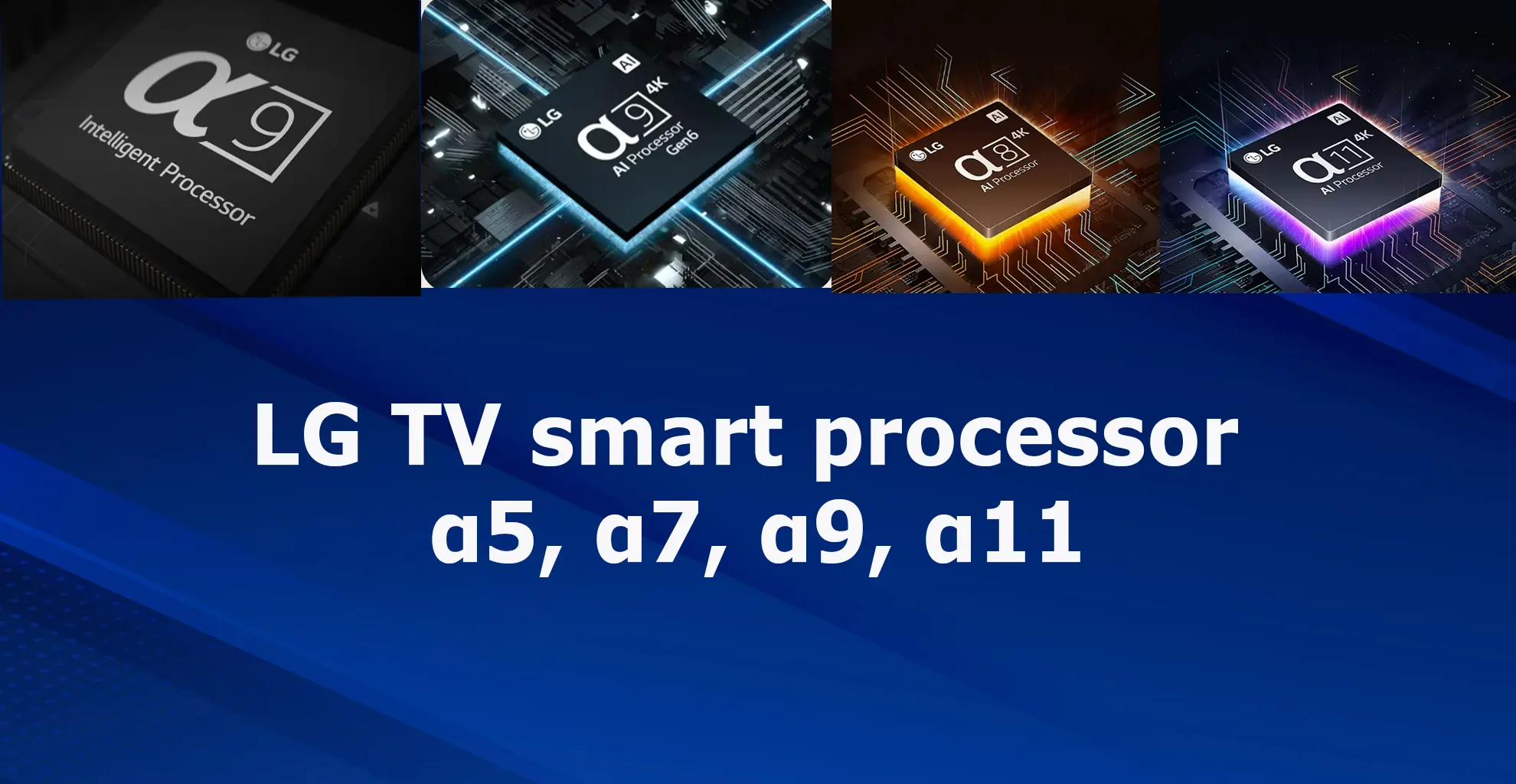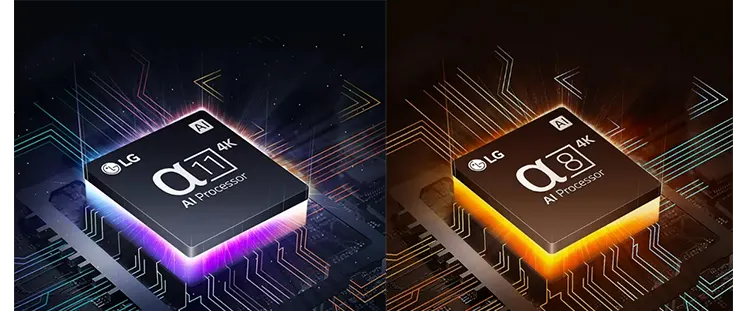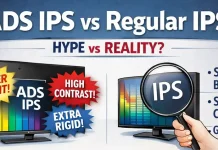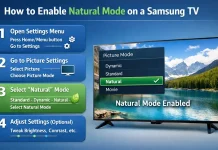In 2017, there was a new trend in TVs – the emergence of intelligent processors. Of course, you should know that processors naturally can not be smart; they do not have any intelligence; they are a set of transistors, capacitors, and other elements. Artificial intelligence is a self-learning program that can perform calculations and make millions of comparisons to find the best result. Therefore, processors designed for intelligent computing, so-called AI processors, have a somewhat unique structure. There are independent cores in the processor that may not participate in the primary process but work for the AI, performing calculations for the AI program. As if by magic, all TV manufacturers have started claiming unique processors in their TVs; LG announced that their TVs now have Alpha processors.
Alpha processors used in LG TVs – explained
The Alpha processors used in LG TVs are conventional processors adapted for TV use. The Alpha name is a commercial name convenient for advertising. As of 2024, LG uses four names for its Alpha5, Alpha7, Alpha8, Alpha9, and Alpha11 processors.
Initially, LG announced Alpha7 and Alpha9 processors and then decided to name all processors. Alpha and Alpha5 processors appeared, and in 2024, Alpha8 and Alpha11 processors were installed in premium TVs. The processors are divided by purpose as follows.
- Alpha5 processors are used in entry-level LED UHD and Nano TVs. These low-power processors, designed for image output with minimal processing, typically support 2 to 4 gigabytes of memory.
- Alpha7 processors are mid-level processors used in entry-level QNED and OLED TVs; their memory is increased, making them faster for mid-range TVs.
- Alpha8 processors will appear in premium QNED TVs in 2024.
- Alpha9 processors are designed for premium OLED TVs.
- Alpha11 processors will appear in premium OLED TVs in 2024.
LG TV Alpha processors: generations, TV compatibility list
Now, a bit about the generations of Alpha processors: you need loud advertising noise to sell any device. Every year, something new has to be introduced in TVs, and Alpha processors have become one of those triggers for LG. Televisions, like telephones, have reached the pinnacle of technical excellence in modern conditions. Therefore, LG marketers have chosen a simple scheme: there is a commercial name for the processor, and every year, we add a generation; this is what we have now with Alpha generation processors.
| Year | Alpha5 | Alpha7 | Alpha8 | Alpha9 | Alpha11 |
| 2024 | Gen7 | Gen7 | Gen1 | Gen7 | Gen1 |
| 2023 | Gen6 | Gen6 | Gen6 | ||
| 2022 | Gen5 | Gen5 | Gen5 | ||
| 2021 | Gen4 | Gen4 | Gen4 | ||
| 2020 | Gen3 | Gen3 | Gen3 | ||
| 2019 | Gen2 | Gen2 | Gen2 | ||
| 2018 | Gen1 | Gen1 | Gen1 |
I decided to make a table where you can see the generation of the processor and find out which LG TV models have these processors installed.
Processor LG a7 vs a9
LG first introduced the Alpha processors under the names Alpha7 and Alpha9. Many immediately had questions about the difference between these processors and their uniqueness. The answer to this question is simple: they are ordinary ARM processors with commercial names. LG’s use of its operating system allows it to block access to processor information at the user level, so there is minimal information about the processors used in TVs. The frequency of the cores and the type of graphics processor are unknown. We can only learn that the processor has four cores, but this information tells us nothing.
The good news is that in some countries, it is required by law to provide detailed hardware specifications to buyers. So, I found out the specs of the first-generation LG α9 processor. Unfortunately, subsequent generations of processors were not available to analyze the specs.
- Technical specifications of LG α9 intelligent processor
- Processor – 4 cores, processor frequency 1.008GHz
- Graphics processor – 2 cores, 700MHz frequency
- RAM Memory – 3Gb RAM
- Built-in Memory – 8Gb ROM
- Technical specifications of LG α7 intelligent processor
- Processor – 4 cores, processor frequency 1.008GHz
- Graphics processor – 2 cores, 700MHz frequency
- RAM – 2Gb RAM
- Built-in Memory – 8Gb ROM
So, if you look at the processors, they are almost identical in performance and use the same CPU and GPU cores. Of course, it could be that the α9 uses newer generation cores. But most likely the difference between the processors is the amount of RAM supported. Now let’s take a look at the processor, stripping away the advertising and marketing gimmicks, and understand the advantages claimed by LG.
Processors for LG Alpha TVs – Advertising Hype
The appearance of Alpha processors, as usual, was accompanied by advertising hype based on the following claimed advantages.
- Experience our best picture quality.
- Quad-Step Noise Reduction
- Frequency-based Sharpness Enhancer
- Object Depth Enhancer
- True Color Accuracy Pro
- Seamless viewing with HFR
After 6 years, the original advertising slogans were abandoned because they did not actually reflect the stated benefits. Gradually, the advertising hype around the processors subsided, and then revived again. In recent years, there has been more and more talk about the quality of image and sound processing thanks to the Alpha processor with artificial intelligence.
In fact, although the advertisement says that Alpha processors support artificial intelligence, this is not true, and the answer to this question is very simple, artificial intelligence systems are self-learning and constantly work, accumulating information. And you disconnected the TV from the network, all the information was erased, so what kind of artificial intelligence can we talk about in this case? Of course, processors are gradually improving, being upgraded to perform new tasks, such as supporting new HDMI port standards or processing new audio and video codecs.
New LG Alpha 8 and Alpha 11 processors
Apparently, this is a new development of processors for TVs. According to LG, these processors are faster, and thanks to this, they can cope with more complex image scaling programs. TVs with these processors can operate at a frequency of 144Hz and be synchronized with computer video cards to display video at frequency video cards.
These processors can also process multi-channel audio in 11.1.2 or 9.1.2 format for output to TV speakers. This implies that the processor is able to combine sound from different channels, correct the levels, and output it to the TV speakers while preserving the entire spectrum of sounds; this is a rather complex algorithm to correctly combine channels and not just discard unused ones.








Probably not, these are specific processors specifically designed for TVs.
Wonder if an a7 can be made into an a9 with ye olde ram rod mod & flash dash splash.
Funny how this article advices LG how to display colours. ”use of a special sophisticated table for displaying colors is not advisable”.But all TVS do it, so what does it have to do for the difference between the processors? Writer doesn’t seem to know what to say.
Take everything here with a huge pile of salt.
LG is the only company that produces large OLED screens.
funny that Sony use the LG OLED ??
The a9 processor makes the TV clearer but the a7 generation 4 in my opinion is better then the first generation a9.
My friend has the new LG C-1 . I HAVE the LG C-9 and my tv has way better color. The best I’ve ever seen. The new LG C-1 Colors are off bad. You have to have it calabrated.
My LG C-9 tv picture is beautiful. But Sony Oleds still has the A9 processor beat. I have both TV. There’s nothing that beats the clearness of the Sony.
It is more expensive, as in a TV with a better processor, can be installed and a better screen. You need to look at all the specifications of the TV.
Excellent, so why are their a9 TVs $500 more expensive?
So in reality, a7 and a9 (any generation) processors have no effect on the image, color, contrast or any element of the dislayed image.